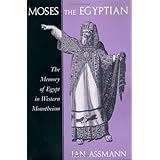
Average Reviews:

(More customer reviews)As several readers have pointed out, Assmann's work is not really suitable to the casual reader, nor the reader unlearned in Latin. That said, most reviewers have suggested that the book be reviewed by someone fairly up on the field.
Assmann calls his project a "mnemohistory," meaning by this a history of the way certain aspects of an ancient history are remembered and distorted over time. The central focus of this mnemohistory, as indicated by the title, is Moses and his Egyptian origins. Assmann is a distinguished Egyptologist, so he wants to root this mnemohistory in Egypt, not in any of the numerous pseudo- or para-Egyptian texts (the Hermetica, for example, or Plato's various renderings of Egypt). In short, the question is this: What, if anything, might ancient Egyptian historical events have to do with later Western conceptions of (1) Egypt, (2) Judaism, (3) Moses, and (4) monotheism in general?
Assmann begins with a seemingly radical thesis: that the historical figure(s) represented in "Moses" was an Egyptian priestly exponent of the Akhenaten/Amarna monotheism, which lasted a couple hundred years and ended under the reign of Tutankhamun. The implication of this is that Judaism, and in particular Mosaic Law, was constructed as a counter-religion to normative (i.e. non-Akhenaten) Egyptian religion.
Having demonstrated that this thesis is plausible, Assmann moves on to examine how this peculiar origin of Judeo-Christian ritual and legal prescription was remembered and reinterpreted across the millennia. He examines Maimonides, John Spencer, and Ralph Cudworth, showing them all recognizing the Judaism-equals-Egypt-backwards connection, but interpreting it variously for philoSemitic, antiSemitic, philoEgyptian, or other purposes.
Next, he moves on to examine the flowering and spreading of this debate through the eighteenth century, where it influenced Deist and Masonic discourse, as well as that of major philosophers. Finally, he moves to what seems to me the heart of the book, an analysis of Freud's _Moses and Monotheism_, examining the ways in which Freud utilizes psychoanalytic techniques to reveal the same half-remembered ancient trauma beneath the very origins of monotheism --- that is, Freud realizes that the hideous cultural trauma inflicted upon Egyptian culture by the Akhenaten revolution led to suppression, repression, and thus to expression in not only monotheism but also a violent aversion for monotheism's apparent originators. In short, Freud discovers in the Amarna trauma the repressed origins of anti-Semitism.
The book concludes with an Egyptologist's analysis of the monotheism of Amarna, on which this reader is not able to pronounce; that said, Assmann's credentials certainly suggest that this should be a most expert reconstruction.
_Moses the Egyptian_ is an extraordinary piece of visionary scholarship, wide-ranging and courageous, but copiously annotated and supported. If, having read this review, you think this book sounds like the niftiest approach to Foucaultian archaeology, or some similar theoretical structure, this book is probably for you. If, on the other hand, you want a careful history in the more classic sense of a narrative, with people and events, and some sort of proof of who Moses "really was," you're not going to get much out of this.
Click Here to see more reviews about: Moses the Egyptian: The Memory of Egypt in Western Monotheism
Standing at the very foundation of monotheism, and so of Western culture, Moses is a figure not of history, but of memory. As such, he is the quintessential subject for the innovative historiography Jan Assmann both defines and practices in this work, the study of historical memory--a study, in this case, of the ways in which factual and fictional events and characters are stored in religious beliefs and transformed in their philosophical justification, literary reinterpretation, philological restitution (or falsification), and psychoanalytic demystification.
To account for the complexities of the foundational event through which monotheism was established, Moses the Egyptian goes back to the short-lived monotheistic revolution of the Egyptian king Akhenaten (1360-1340 B.C.E.). Assmann traces the monotheism of Moses to this source, then shows how his followers denied the Egyptians any part in the origin of their beliefs and condemned them as polytheistic idolaters. Thus began the cycle in which every "counter-religion," by establishing itself as truth, denounced all others as false. Assmann reconstructs this cycle as a pattern of historical abuse, and tracks its permutations from ancient sources, including the Bible, through Renaissance debates over the basis of religion to Sigmund Freud's Moses and Monotheism. One of the great Egyptologists of our time, and an exceptional scholar of history and literature, Assmann is uniquely equipped for this undertaking--an exemplary case study of the vicissitudes of historical memory that is also a compelling lesson in the fluidity of cultural identity and beliefs.
Click here for more information about Moses the Egyptian: The Memory of Egypt in Western Monotheism

0 comments:
Post a Comment